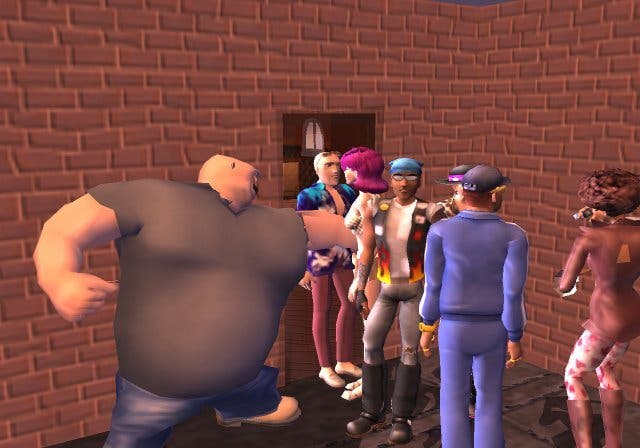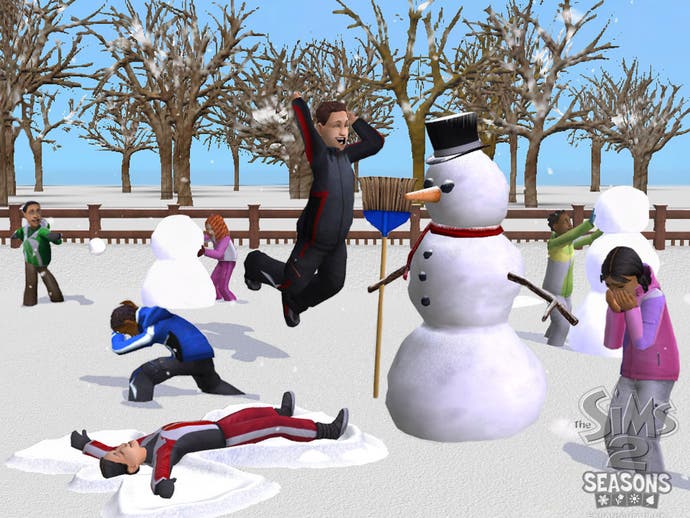The History of The Sims
Tiny happy people.
A change was clearly required, and The Sims 2 launched in 2004, reinvigorating the fanbase and attracting the sort of loving reviews that had all but tailed off as the original game and its expansions ran out of steam.
Addressing many of the problems that had become apparent over the lifespan of the previous game, The Sims 2 turned its chatterbox avatars into far more complex creatures than the pissing and shouting automatons of 2000. Basic bodily functions were now easier to maintain, while the gameplay shifted emphasis from craven material gain to more lofty emotional goals. The relationships between Sims became more realistic, with emotional bonds forming and breaking, along with hopes and fears tied to family, careers and health. Sims could now grow old and die, while baby Sims would take on genetic elements from both parents, and carry them on down the family tree.
The game also received a visual lick of paint, with a free-roaming camera that could take the player up into the clouds or face to face with their creations. "It's a thoroughly charming package rammed with possibilities," declared the previously Sim-phobic Kristan. "We wouldn't hesitate to recommend it to those that have so far resisted its charms, and for the real fans it'll be a dream come true, but whether we'll stick with it is another matter. Ask us when the inevitable expansion hits..."

Prescient words, as The Sims 2 followed in its predecessor's footprints and coughed up seven expansions in just a few short years, with many of them reusing the same themes as before. University immersed Sims in the drink-and-promiscuity college lifestyle, hopefully spitting them out at the other end with vaguely improved job prospects. Yay, realism! Nightlife juggled ideas from both House Party and Hot Date, focusing on the nocturnal social life side of things, while Pets and Bon Voyage were both updated versions of the Unleashed and Vacation expansions of yore.
Some of the new expansions, however, took advantage of the muscular new algorithms churning away beneath the surface to deepen the playing experience. Open for Business, for instance, freed the Sims from the rigid career paths of old and enabled them to open their own shops in a specially designed commercial location. Seasons, meanwhile, added variable weather to the game - something fans had long been clamouring for - as well as a more nuanced approach to Sim nutrition. Previously, Sims bought food, Sims cooked food, Sims left food to rot on a plate on the floor for no apparent reason. With Seasons, it was now possible to grow organic vegetables and catch fresh fish, store them in the fridge and use those for meals in order to receive beneficial status boosts. Combined with Open for Business, it also meant that Sims could go into the full-time grocery trade which really was very exciting for many players and oh just shut up and go back to your shooty games.

With the Sims back on everyone's lips (including each others) the console players weren't left out. Although they probably wished they were. The next variation on the theme to arrive in joypad land was the atrociously named The Urbz: Sims in the City. As the name suggests, this was a self-consciously hip and urban city-dwelling spin on The Sims, so painfully desperate to impress the fickle youth audience that ended up as a monstrous embarrassment. How low did it go? Pop-rap annoyances Black-Eyed Peas appeared in the game, singing their awful songs in the babbling language known as Simlish. Oh yeah. As Poochie was to Itchy & Scratchy, so The Urbz was to The Sims. "The Urbz finally boils down to you performing the same actions over and over again to impress people," glowered Pat back in November 2004 when the game body-popped into the shops. "As an extension of The Sims as a franchise it categorically fails to engage."
Things took a turn for the surreal the following year as every gamer's favourite headline-hogger, crusading law warrior Jack Thompson, took time out from throwing eggs at Rockstar's bedroom window to have a pop at the seemingly benign world of The Sims. Surely a tongue-in-cheek simulation of exaggerated suburbia could contain nothing to inflame the passions of this most righteous demagogue? That's what most people would think, but most people aren't Jack Thompson.
